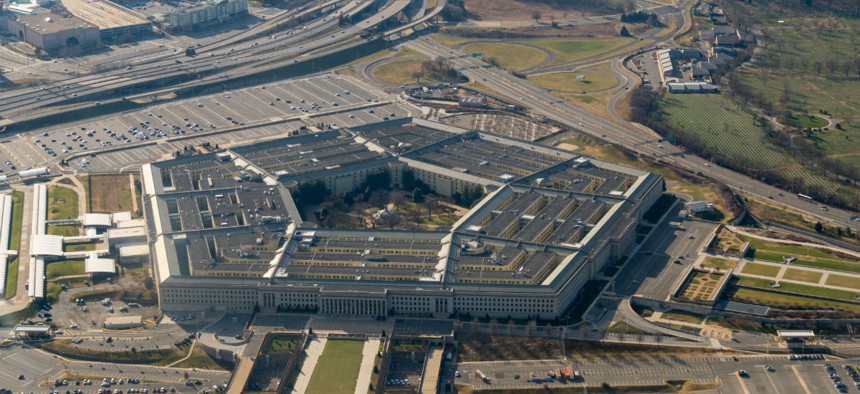Pentagon’s Delayed Report On Services Contracts Draws Union Ire
The Defense Department says the required documents that detail spending are “at the printer.”
The massive National Defense Authorization Act for fiscal 2018 contained language requiring the Pentagon to provide more detail on its spending plans for $144 billion in services contracts.
But in the Trump administration’s fiscal 2019 budget released in February, the document that provides the most comprehensive information on services contracting was missing. The omission was spotted by specialists at the American Federation of Government Employees, who pointed out that last year’s submission carried more detail, while this year’s was limited to an “advisory and assistance services” document with simple line items.
“DOD has ignored the contract services budget requirement in its FY 2019 budget request,” the union said in a statement to Government Executive. “Instead, the department only submitted information on “Advisory and Assistance” contracts, which constitute a small fraction of one percent of overall DOD service contract spending. With the Trump Administration perceiving DOD as a piggy bank for non-Defense priorities, this continued lack of accountability for at least $144 billion per year in spending requires immediate congressional attention . . . to protect taxpayer dollars.”
Asked for comment, Defense spokesman Christopher Sherwood said on Wednesday, “The contract services budget details are contained in the Operations and Maintenance overview book, which is at the printer. We should have it shortly and then will post it online, hopefully later this week or next.”
An aide to House Armed Services Committee Chairman Mac Thornberry, R-Texas, confirmed that the chairman has been pushing for greater detail on Pentagon spending on services contracts. In announcing the acquisition reforms in the 2018 bill, the chairman said the requirements would force the Pentagon to analyze actual needs and spending patterns for service contracts much like they do for weapons. “Those within the DOD who need to contract for a service will have to specify their requirements early enough to have them validated, the contracts awarded, and the funding secured,” he said. “Congress will have a better idea of what kinds of services are being contracted and their cost, improving oversight and enabling efficiencies."
But the aide added that “we’re not particularly upset that the [larger document] is not out yet because we never found it be particularly useful. It was so general, it didn’t fulfill the oversight purpose for which it was mandated, and that in part inspired our reforms in last year’s bill.” He added that the committee is “very satisfied” that DoD is pursuing those reforms.
Another reason not to worry, said David Berteau, president and CEO of the Professional Services Council, which represents 400 contracting firms, is that the comprehensive services spending plan “usually lags several weeks behind the actual budget release, and the material trickles out over a number of weeks.”
That is in a normal year, Berteau added. This year, because of the delayed fight over a two-year budget package, the fiscal 2019 budget had to be ready in February just days after the bipartisan budget agreement was signed, and without a baseline from the previous fiscal year. “I don’t believe this was a consequence of deliberate delay,” Berteau said.
The lack of specifics in the Pentagon’s services contracting plans was highlighted by the Government Accountability Office in a February 2016 report, which called on Congress to require more long-term forecasting. “DOD’s budget exhibits on contract services provide limited visibility to Congress on planned spending, and the primary exhibit for contracted services does not meet statutory reporting requirements,” it said.
AFGE, which has always been concerned about DoD outsourcing work that the union believes belongs in-house, asked that the Senate and House Armed Services as well as the Appropriations committees “exercise proper oversight” by demanding immediate submission of the budget exhibit and implementing the GAO’s recommendations.








